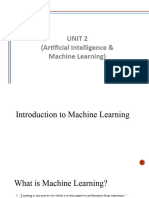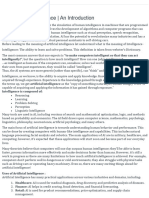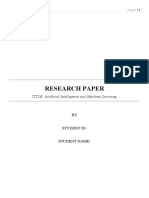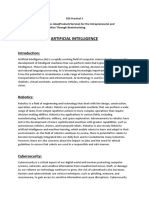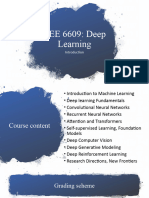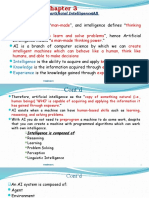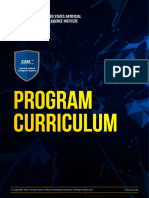Applications of AI
Uploaded by
humaira81416Applications of AI
Uploaded by
humaira81416Applications of AI
Artificial Intelligence can be used to solve a lot of problems. It can also be used to automate
complex systems. There are a number of AI approaches which can be used to solve different types
of problems. Note that, any approach cannot be used to solve any problem. The approach we use
to solve a problem depends on the type of problem. This document is intended to provide students
a suggestion for what approaches to use to solve different classes of problems.
Search, Goal finding, Path finding, planning
Approach(es):
State space search
Examples:
Water-Jug problem
8-puzzle problem
8-Queen problem
Finding shortest path between cities
Solving a theorem
Classification, Pattern recognition
Approach(es):
Neural network
Markov model
Support Vector Machine
Examples:
Speech recognition (Hidden markov model/Neural nework)
Image processing (Neural network/ Support Vector Machine)
Game playing (Two player games)
Approach(es):
Mini-maxing
Alpha-beta pruning
Trained Neural networks
Examples:
Chess
Go
Tic-tac-toe
Decision making (in uncertain environment)
Approach(es):
Markov decision process
Bayesian network
Dempster-Shafer theorem
Neural network
Examples:
Symptom diagnosis (Bayesian network/ Neural network)
Control system (in uncertain environment)
Approach(es):
Fuzzy logic
Examples:
Washing machine
Temperature control system (Air conditioner)
Knowledge representation and inference
Approach(es):
Predicate logic
First-Order Predicate logic
Examples:
Einstein’s puzzle
Symptom diagnosis
Answering questions about a domain
Tools:
Prolog
LISP (List Processor)
Popular approaches based on problems
Image processing:
Neural network
Support Vector Machine (SVM)
Object recognition:
Support Vector Machine (SVM)
Deep Neural network (Multi-Layer Backpropagation / Recurrent Neural network)
Speech recognition:
Support Vector Machine (SVM)
Deep Neural network (Multi-Layer Backpropagation / Recurrent Neural network)
Decision making, planning:
Bayesian network (Symptom diagnosis)
Markov decision process (Online attack prevention)
Automated car driving:
Deep Neural network
Fuzzy logic
AI in two player games:
Minimaxing with alpha beta pruning (Chess/Tic-tac-toe)
Neural Network + Minimaxing with alpha beta pruning (GO)
Intelligent control systems:
Fuzzy systems (Washing machine/ Air conditioner/ Robot control)
Neural networks (Robot control)
Natural Language processing:
Speech recognition -> Predicate logic -> Inference


















